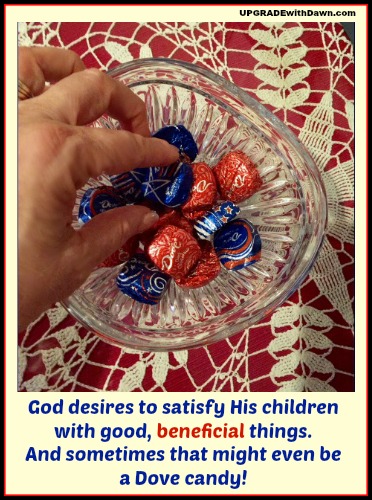Focus on the 'Beneficial'
In this Choices UPGRADE, Dawn Wilson shares a principle that helps her make a lot more wise and godly choices.
I reached out for another Dove candy. Now there’s nothing wrong with a Dove candy. I love the dark chocolate, the milk chocolate and all the other new flavors. (I'll be honest. I love just about ANY kind of chocolate. Don't even get me started on See's. But let me tell you my Dove story.)
 I reached out for a chocolate, nestled in my crystal candy dish, and I heard this little voice in my brain. . .
I reached out for a chocolate, nestled in my crystal candy dish, and I heard this little voice in my brain. . .
“Now how is that going to help you?”
“What do you mean HELP me?” I asked the voice.
“I mean,” the voice continued, “I know you want the chocolate. I know you even crave the chocolate. It’s inviting and there’s nothing wrong with it.”
“Right—so what’s the problem?”
“An hour from now, is it going to be something you'll be glad you ate?”
I wanted to say, “Of course.”
But I stopped short, my hand poised over the candy dish.
Why? Because another voice (and I believe it was the Spirit of God) reminded me of a scripture.
Paul wrote, in 1 Corinthians 10:23:
“I have the right to do anything,” you say—but not everything is beneficial.
“I have the right to do anything”—but not everything is constructive.
In other words, there are lots of lawful (morally legitimate or permissible) things we are free to do because God is generous to His children and we live under grace.
"But...", Paul says.
It's that word "but" that stopped me from taking a piece of candy.
Now there is nothing sinful about a Dove candy. In fact, sometimes it might be a good and right choice.
But in that moment, when I thought about it, I knew this was not the time for a chunk of chocolate.
But how often do I even stop to THINK about it.
As I am thinking about food and a lot of other issues in light of Paul's words, I’m noticing:
- Not everything is good for me.
- Not everything is advantageous.
- Not everything is helpful.
- Not everything strengthens my body.
- Not everything builds up my character.
- Not everything edifies my spiritual life.
- Not everything is a good example to others.
- Not everything shows sensitivity and deference.
For years I’ve written about choices. We make them every day. And as I’ve said, we make so many choices without a thought.
I’ve found the toughest choices are about the things that are OK, but not necessarily the best for me.
I don’t have to get crazy and legalistic or endlessly dissect every option that comes my way. But there's something I should do.
I need to consider what is best for me, is a blessing to others and is a means to honor God.
I need to think about how I can live well and help others live well, and how I can please the Lord.
Beneficial choices are “favorable or advantageous, resulting in good.” They have positive benefits and are valuable, profitable and rewarding.
Who wouldn’t want that?
This topic of things being beneficial was a powerful concept for Paul. In 1 Corinthians 6:12, he gave more insight, writing:
“Everything is permissible for me,” but not everything is beneficial.
“Everything is permissible for me,” but I will not be mastered by anything.
There's a lot more at stake than we think!
How do we focus on what is beneficial so we can make wise choices?
1. Ask God for wisdom.
The sovereign God knows what is best for us. He knows how our bodies and our lives should operate. He wants to help us know too, but we must pray and ask Him for wisdom (James 1:5).
I remember hearing a “missionary story” years ago. A missionary prayed for some special foods he was craving, and when a crate arrived from the states, he opened it with great excitement.
Imagine his dismay to find bags and bags and bags of white rice. He said he struggled with godly contentment in that moment.
But sometime later, he became gravely ill and the doctor prescribed—you guessed it—white rice! The missionary thanked his Father in heaven for sending exactly what he needed ahead of time.
Rather than asking amiss (James 4:3), let’s ask God for what is right and helpful, the most beneficial. HE KNOWS what we need!
2. Give Yourself More Beneficial Options.
When I decided I wanted to become healthier and lose weight in the process, one of the first things I did was reduce and eliminate the unhealthy options in my kitchen and replace them with lots of good, healthy “eats.”
When constantly faced with something that’s NOT beneficial, it’s only a matter of time before we’re tempted to give in to temptation.
But stocking our pantry with healthy options invites a healthy focus. We still have to choose wisely, but it’s smart to give ourselves positive, healthy alternatives.
A Helpful Note: While you consider the "options" in your life that can help you conquer your unhealthy or ungodly habits, be careful not to make room for the enemy—don't give the devil any opportunities (Ephesians 4:27). Is there something that needs to go?
3. Set Your Heart on the Master.
The early church struggled with what to do regarding food sacrificed to idols (1 Corinthians 10:23-33). In that context, Paul said everything is permissible or "lawful" (v. 23), but—as I said earlier—he also didn’t want to be "mastered" or dominated by sinful habits (1 Corinthians 6:12) and he didn't want to be a stumbling block to anyone coming to Christ.
Paul didn’t want habits and choices to hinder him or destroy his testimony and ministry.
He wanted to do all to the glory of God and with a spirit of gratitude (1 Corinthians 10:30-33).
Likewise, we don't want to be enslaved by sexual immorality, lying, gluttony, arrogance or any other sinful patterns. We want to do all things to the praise of God's glorious grace (Ephesians 1:6).
Another disciple, Peter, knew that whatever overcomes a person, to that he is enslaved (2 Peter 2:19).
Rather than be overcome, we can be overcomers in Christ.
When our hearts are set on the Master, we will live in freedom and not want to BE "mastered" by enslaving choices and habits. In Christ, we can make choices that are beneficial for our own lives and the lives of others.
We might mess up a lot and make unbeneficial, enslaving choices—I certainly do—but what direction are we moving. Toward obedience and contentment? Or toward wilfulness and foolish discontent.
- Instead of focusing on your weaknesses, focus on Jesus, your strength.
- Instead of focusing on what you can't have, consider all you already have!
4. Don’t Forget God’s “Benefits”
When we think about something that is beneficial to us, we don't want to forget the One who gives us these benefits!
He blesses us simply because we are His children. He extends great mercy. He gives great grace. He saves us and then transforms us.
We already are so blessed. Let's never forget that.
In Psalm 103:1-5, the Psalmist praises God because He:
- Forgives all our sin;
- Heals all our diseases—in eternity, if not now;
- Redeems us from the “pit” of destruction in hell;
- Crowns (lavishly surrounds) us with His faithful love and mercy;
- Satisfies us with good things; and
- Renews our strength.
We are such discontented people. We want more and more, and forget our abundance in Christ. I am thankful for all of these things the Psalmist listed and so much more. I am so blessed.
Yes, God saved me, is changing me, and He desires to satisfy me with good, beneficial things.
Sometimes He might bless me with "white rice"—because He knows what I need.
And sometimes He might bless me with a yummy Dove candy—because He loves me and delights in giving good gifts.
What are some of the benefits you are enjoying as a child of God? How can focusing on those benefits give you a different perspective for change and spiritual growth?
Dawn Wilson, founder and President of Heart Choices Today, is a speaker and author, and the creator the blog, Upgrade with Dawn. She is a contracted researcher/reviewer for Revive Our Heartsand a writer at Crosswalk.com. She and her husband Bob live in Southern California and have two grown, married sons, three granddaughters and a rascally maltipoo, Roscoe.
creator the blog, Upgrade with Dawn. She is a contracted researcher/reviewer for Revive Our Heartsand a writer at Crosswalk.com. She and her husband Bob live in Southern California and have two grown, married sons, three granddaughters and a rascally maltipoo, Roscoe.
 Post a Comment → Posted on
Post a Comment → Posted on  Thursday, July 26, 2018 at 9:00AM
Thursday, July 26, 2018 at 9:00AM  Beneficial,
Beneficial,  Benefits,
Benefits,  Enslaving Habits,
Enslaving Habits,  God is Good,
God is Good,  God's Goodness,
God's Goodness,  Habits,
Habits,  Health,
Health,  Healthy options,
Healthy options,  James 1:5,
James 1:5,  Overcomer,
Overcomer,  Weight Loss,
Weight Loss,  Wisdom Upgrade Your Life
Wisdom Upgrade Your Life  Choices,
Choices,  Health,
Health,  Self-Care,
Self-Care,  Victory
Victory 




